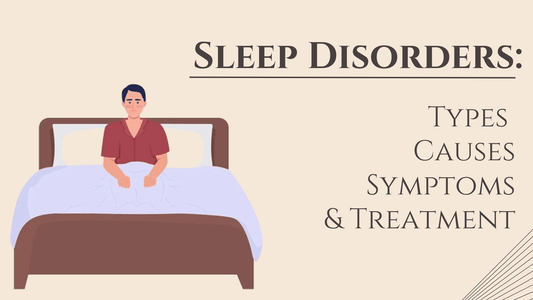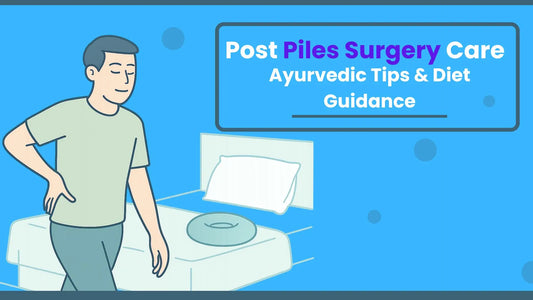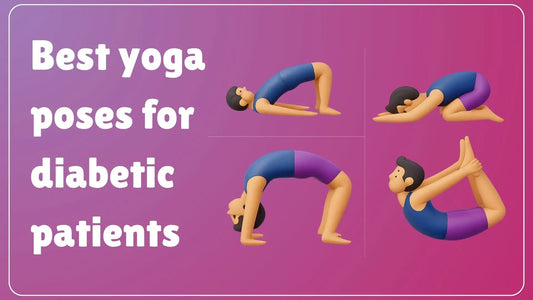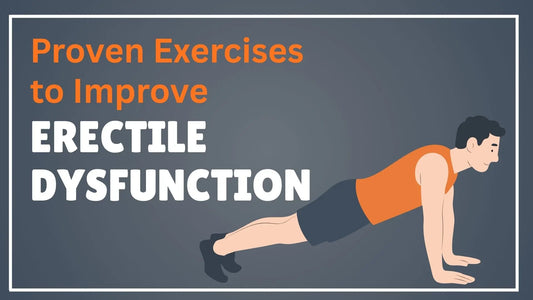
Sleep Disorders: Types, Causes, Symptoms & Treatment
For many reasons, people suffer from sleeplessness or sleep apnea. Another term used for sleep apnea is insomnia. Our mind is filled with numerous thoughts and plans in our regular lives. If such plans or thoughts remain unsuccessful or goals are not fulfilled, then stress takes over our minds.
Unfulfilled desires or stress constantly linger at the back of our minds and keep us awake continuously during nighttime sleep. Fear of failure and inability to achieve the respective goals turns into depression and anxiety.
Other serious mental health issues follow up. One of them is bipolar disorder. A person with such a mental condition does not sleep well with consistent racing thoughts invading his mind.
Types of Sleep Disorders
Many of us face 6 different types of sleep disorders as found by the researchers:
Lack of Sleep
It is what when you are deprived of sleep at night or whenever your body requires rest. It can make you feel frustrated, unhappy and sometimes eccentric.
You may have to struggle with your focus on your duty or any sort of responsibility. If you are continuously facing the problem of sleep deprivation then it would turn into insomnia.
Chronic Snoring and sleep apnea
People face the problem of chronic snoring due to obstruction in the nasal passages and that leads to breathing difficulty.
Snoring causes the person to suffer from low oxygen levels and cardiovascular problems. Such health disorders do not let the person have a deep and continuous sleep.
Circadian disorders
It is what disruption in the internal clock that one may face by not synchronizing with the external environment. It usually happens to those who are back from their shift work or have jet lag and find difficulty in adjusting to the sleep-wake cycle.
Movement disorders
It is about the consistent movement of the legs which causes interruption in the sleep-wake cycle.
Parasomnias
It is related to abnormal behavior or display of emotions during sleep. It is a pattern of sleep disorder. In such a state, a person might be walking during sleep, undergoing night terrors or talking in the sleep.
Display of such behavior during sleep may interrupt the sleep quality and further lead to injuries and impair the overall metabolism of the body.
Too much sleep
Its medical term is hypersomnia. It is about sleeping beyond the adequate time of sleeping hours. You may be in a state of not being able to wake up in the morning by prolonging your nighttime sleep.
It would only disturb your internal body clock, You, may feel tired throughout the day and suffer a lack of focus and efficiency. It will not let you fulfill your daily duties or work.
Causes of sleep disorders or insomnia
The major causes of insomnia stated are:
- Strain and tension grow in the mind concerning big life events which may be the loss of a job or movement to a new place, the decease of any family member, or separation or divorce from a family member.
- Noise, radiance or light, and high temperature.
- Alterations in your sleep conditions which may be like jet lag, changes in your official duty hours,
- The problem of insomnia runs in the other family members.
The secondary causes of sleeplessness or insomnia are:
- Mental unwellness which may include depression and anxiety.
- Consumption of medicines for mental unwellness ness, insomnia, cold, high blood pressure,or critical illnesses related to heart and digestion.
- Stomach disorders or pain in the joints and bones or arthritis.
- Abuse of drugs or dependence on tea, coffee, and any other caffeine beverage.
- People under the impact of hyperthyroidism and endocrine disorders suffer from nerve disorders. Such nerve disorders do not let the person throughout the night. Such disorders interrupt the sleep-wake cycle
Signs or symptoms of insomnia or sleep disorder
Signs and symptoms of sleep disorders will enable the expert to diagnose and find suitable treatment or medication. And also early recognition of the symptoms cautions about the complications of the untreated sleep disorder:
- Struggling to fall asleep for 30 minutes.
- Frequently waking up from sleep
- Snoring, gasping and choking occur while being asleep
- Changing positions during sleep
- Irritability in the behavior
- Failing to meet the target in the office or in career.
- Meeting with accidents or falls
- Experiencing behavioral transformations or losing focus
Treatment for sleep disorders
One can approach a regular modern qualified doctor or ayurvedic physician to manage sleep disorders. Modern treatments are:
Cognitive behavioral therapy
It is clinically proven that the way it positively impacts’s person is by reversing negative thoughts and behaviors and improving the quality of sleep.
Sleeping pills or stimulants
By diagnosing your symptoms, the doctor might prescribe you zolpidem (Ambien), eszopiclone (Lunesta) to induce deep sleep and melatonin supplements to improve the sleep-wake cycle.
You may also be prescribed Provigil or Modafinil to stimulate your wakefulness throughout the day and help you experience super-quality nighttime sleep.
Light therapy
It is about getting exposed to light emitted by a specific lamp for a certain period which will help in setting the body’s internal clock in the right direction and stimulating the sleep-wake cycle accordingly.
Continuous positive air pressure
Using a Continuous positive air pressure machine (CPAP) will help in cleansing the air passage through the nostril and control the problem of snoring or obstructive sleep apnea.
Ayurvedic treatment
People in the Indian subcontinent have been trusting Ayurveda for over 5000 years for healing mild to severe or complex disorders.
As a holistic approach, it helps promote mental, physical and emotional balance within any person. Ayurveda optimizes the overall health condition of any person. Researchers have found success with certain Ayurvedic methods like:
Herbal teas
You can prepare and drink herbal tea using organic herbs like chamomile, lavender or passionflower. Such organic teas will aid in soothing the nerves and combating sleep disorders.
Aromatherapy
Many are deprived of good sleep due to recurring joint pain. Adding essential oils like lavender or chamomile to the warm bath will cool down the nerves and relieve you from tiring nerves and ailing joints in the body.
Ayurvedic herbs
Using natural herbs like shankhpushpi, Ashwagandha, jatamansi and Brahmi will relieve from stress and a state of wakefulness. Such herbs will stimulate a state of restfulness and better quality sleep. There will be no side effects like traditional sleeping pills.
Yoga and meditation
You can either lie in corpse position or shavasana, leg up the wall pose or simply try Padmasana to overcome the problem of sleepless nights. You can try these best yoga poses for deep and better sleep.
Other preventive measures for controlling insomnia
- Waking up and going to bed at the right time. Make sure that you do not go to sleep at late night and wake up late. Such irregularity can cause mental health issues and insomnia.
- Don't keep mobile phones, laptops, digital clock or any electronic gadget near your bed. Such items may disturb your sleep-wake cycle.
- Avoid taking tea, coffee and any other caffeinated drink two hours before going to bed.
- Keep the bedroom lighting condition dark and if possible use a sleeping mask to cover up your eyes.
Conclusion
It is not that everyone is fortunate enough to have a peaceful and deep sleep. Different setbacks and challenges keep several people awake throughout the night. Snoring is a form of obstructive sleep apnea that arises due to blockage in the air passage.
Even too much of sleep is not good for health. Lack of sleep becomes chronic insomnia and it may require medical attention or treatment.
Diagnosis of the symptoms of sleep disorders will help you to get the right medicine and advice. Further, sipping a cup of herbal tea made from different herbs and performing yoga will calm down your nerves and induce a better quality of sleep.

SAT KARTAR
Sat Kartar Limited is a trusted name in the field of Ayurveda, dedicated towards bringing you a holistic solution for your overall wellness. We have been serving people with real, natural solutions for more than 12 years. Through our educational blogs, health resources, and product innovations, we aim to empower people to embrace Ayurveda as a way of life and restore their inner balance, strength, and vitality.



